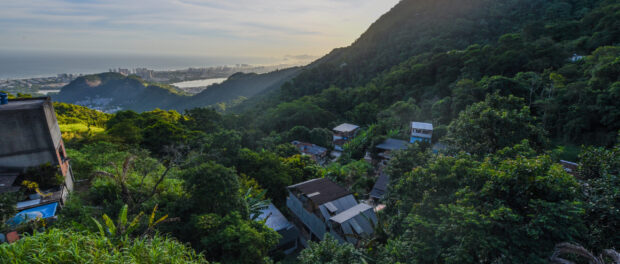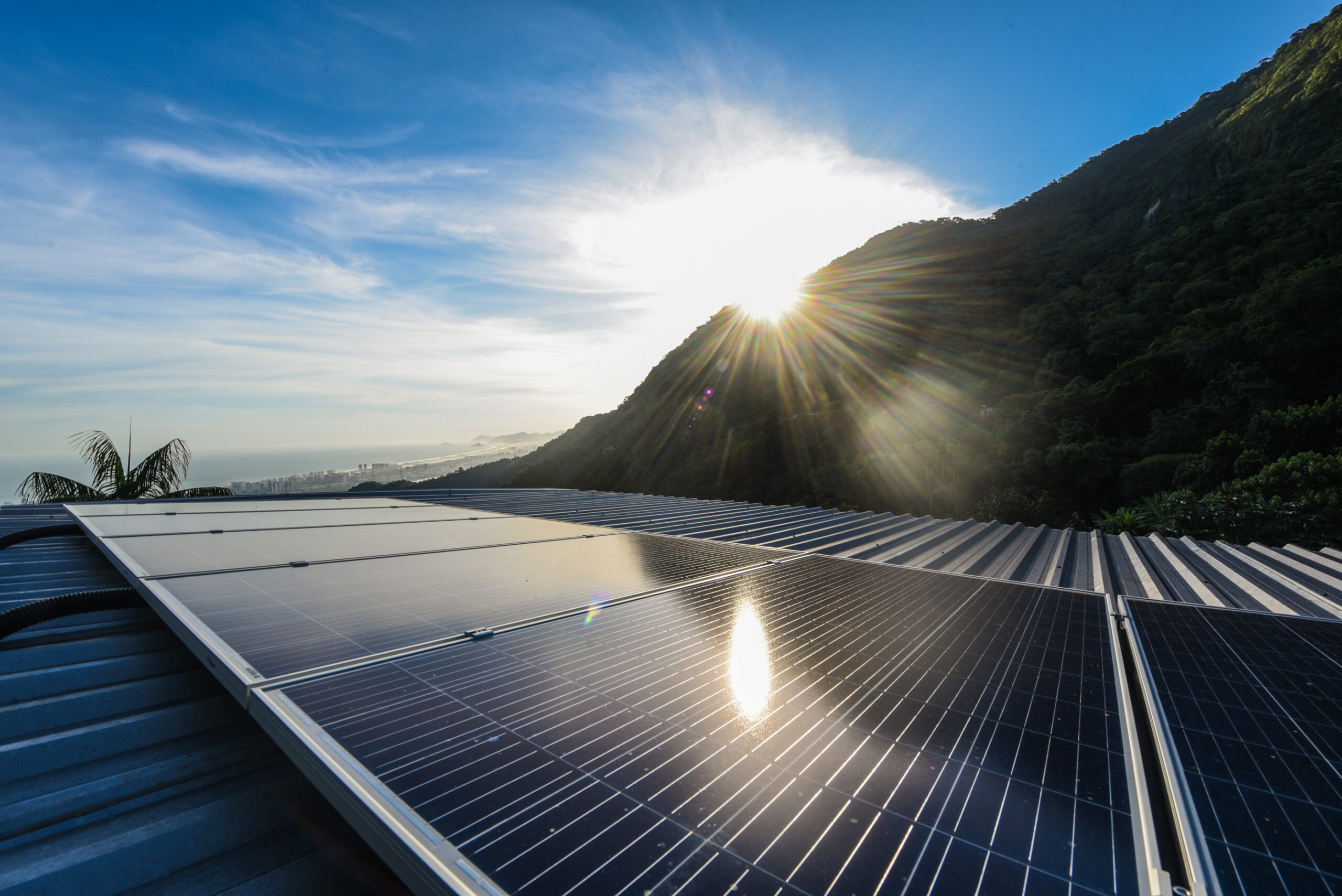
Thirty years after the Rio ’92 Earth Summit, on June 4,* press conference and launch event will bring together residents and allies responsible for the sustainable project. Click here to register. [View PDF]
Vale Encantado, a small, century-old community isolated within Alto da Boa Vista, a forested area in the middle of and overlooking Rio de Janeiro, just took its greatest leap as a reference and incubator of sustainable practices. On June 4,* local families and allies will host journalists and community leaders from across Rio de Janeiro for a press conference and the official launch of the community’s most recent and greatest achievement to date: a biosystem that fully treats local sewage, keeping the surrounding forest clean and protecting resident health. The event will take place at the community cooperative, which also benefitted from recent sustainable investments in solar panels.
A Dream Come True Thirty Years After the 1992 Rio Earth Summit
The community of Vale Encantado was founded in the 19th century by coffee plantation workers before the region was reforested and became the Tijuca Forest, one of the world’s largest urban forests. After 150 years, Vale Encantado found itself isolated in the forest, no longer permitted to make a living by extracting natural resources from its surroundings. Currently, according to the local residents’ association last census, approximately 100 people make up 40 families that live in the community’s 27 homes.
Vale Encantado’s story has been evolving more intentionally towards sustainability over the past thirty years, since the 1992 Rio Summit, when changes in the City’s environmental policies impacted local income generation, which previously came from mining (and before that from coffee and floriculture).
At the onset of the 2000s, aided by partners, resident Otávio Alves Barros, who currently presides over the residents’ association and the local cooperative, noticed the need and potential of adopting a more sustainable approach based on ecotourism and local vegetarian cooking by community residents, taking advantage of homegrown and forest ingredients. Gradually, he also started to make use of green technologies to realize the community’s development and fight threats of eviction. By always attracting partners, Barros realized projects ranging from solar water heating to a biodigester to process food waste, meeting the needs of the cooperative’s restaurant that served vegetarian treats to tourists. The restaurant’s kitchen subsequently used the gas generated by the biodigester for cooking.
Despite these victories, the community’s largest contamination to the environment persisted. Incapable of meeting the sanitation needs of much of Rio, it was difficult to imagine that the water utility might someday bring basic sanitation to this small, isolated place. And this affected the quality of life of residents and their capacity for local income generation.
“Working as a tour guide, I took tourists to a small waterfall we have here. They’d ask me if they could bathe in it and I’d have to tell them they couldn’t. That motivated me to look for a solution.” — Otávio Alves Barros

Vale’s Biosystem: An Accessible, Decentralized and Sustainable Sewage Treatment Solution
An ecological sanitation biosystem started to be developed in 2015 through a new partnership, this time with researchers from Rio’s Catholic University (PUC-RJ) who won a public bid through the Research Support Foundation for the State of Rio de Janeiro (FAPERJ) to build a biodigester with the appropriate dimensions and size to treat the sewage of every house in Vale Encantado, although only five houses were able to be connected in this first stage.
In 2021, the Sustainable Favela Network* (SFN), through its managing organization Catalytic Communities (CatComm), and the Environment in Motion Institute, through German NGO Viva Con Agua, attracted the resources necessary to finish the system that connects all of Vale’s homes to the sanitation network. Through this support, and through technical support from Taboa Engenharia, which participated in the biosystem’s construction as well as providing earlier support in building the restaurant’s biodigestor, as of June 4, 2022,* all of Vale Encantado’s 27 buildings will have their sewage fully and ecologically treated inside the community itself.
This final round of construction began in October 2021 with the mapping of the community’s linkages, visits to homes and exchanges with residents about the project. In sequence, the builders, all of them community residents paid to build out the system, received training in hydro-sanitary installations by engineers from Taboa Engenharia. Construction began in January and over subsequent months residents installed pipes connecting the 27 houses to the biosystem, and repairing the biodigester and the root zone—a post-treatment technology that plays an important role in the phase following biodigestion.
“My dream is that this place may one day become a tourist spot to generate income for our most vulnerable families.” — Otávio Alves Barros
The channeling and treatment of sewage are the primary impacts that the biosystem generates for Vale Encantado. Previously, residents had no option but to dump sewage in the stream that flows through the community, causing bad odors, a higher prevalence of rats and cockroaches, and contamination of the region’s springs. In addition to sewage treatment, the system is also generating opportunities for residents.
“Visitation increased greatly, with people wanting to see the community that treats its sewage. So, with this, we were able to have sightseeing tours. There’s a whole income-generation possibility based on the sewage treatment system.” — Leonardo Adler, Taboa Engenharia

Solar Energy: Another Step Toward Sustainability
On January 3, a solar system comprised of six modules was installed on the rooftop of the Vale Encantado Cooperative. The cooperative was created in 2007 by residents with the goal of generating income for the community through sightseeing tours and the restaurant. However, the arrival of the coronavirus pandemic immediately interrupted work. Subsequently, with the improvement of the pandemic situation, a series of challenges still prevented cooperative activities from resuming, including the cost of electricity and accumulated debts brought on by the need to preserve the agroecological dishes produced for sale by the community and stored in freezers during the pandemic. The installation of the solar panels was a way to solve these problems and guarantee the cooperative’s future.
Hans Rauschmayer, one of the founders of Solarize Trainings, a pioneer business in promoting solar energy courses in Brazil, was the partner Barros sought out to develop the project. The two had already worked together in the installation of a solar water heater previously installed in Vale and reconnected through the energy justice work realized by the Sustainable Favela Network, which obtained the financial resources to make the installation possible. Rauschmayer explains that “in the SFN group, we looked for and received requests from favela organizations that wanted to have solar energy.”
As with the biodigester project, residents were trained to install the panels. Ecori Solar and Almax Energia were two businesses that donated equipment. For Rauschmayer, Vale Encantado is a place that keeps reinventing itself in search of new solutions and therefore deserves our full support. “I hope that, from Vale Encantado, we get to take solar energy to more places,” he says.
Energy that uses sunlight to generate electricity has numerous benefits, even though the cost of solar panels is high. The main advantage for the community is the decrease in its electric bill. With photovoltaic plates, the cost of electricity can decrease up to 95%, with only a minimum fee required to pay the utility. The great gain for society is the preservation of the environment through the non-emission of pollutants into the atmosphere arising from energy production and the consequent mitigation of climate change.

Sustainable Vale Encantado
The launch of the sewage treatment biosystem and the solar panels represents yet another victory for Vale Encantado and for all Sustainable Favela Network participating communities that have been consolidating themselves every day as protagonists of sustainable development in Rio de Janeiro. For Vale and other communities, this marks decades of residents’ struggles for self-reliance and sustainability.
The multiplicity of projects with social, economic and environmental impacts demonstrate the desire of the Vale Encantado community to become a reference. In addition to the initiatives listed above, others were also developed by residents over time, in partnership with partner organizations and supporters. Yet, at the same time that the community is making great strides towards sustainable development, the longtime risk of eviction has haunted those who live there. Families who have been there for well over a century are accused of invading the area unlawfully and causing environmental damage. For Barros, these accusations are inconsistent because residents themselves are the ones who preserve the forest.
“We hope that with all of these projects being developed, [policymakers] have a different outlook and stop pinning the community as an environmental degrader. On the contrary: if you take photos from 1985, 1990 and 2005, you’ll see the forest’s growth.” — Otávio Alves Barros
*The launch, originally scheduled for April 30, was postponed to June 4 to provide an additional month for the natural process of adaptation of bacteria that characterize the biosystem to take place, in order for the event to take part in activities associated with World Environment Day being developed by the Sustainable Favela Network in solidarity with the Popular Conference on the Right to the City and to enable the participation of more journalists and members of the press.
PRESS CONTACT
Click here to participate in the press conference and launch.
Email: press@catcomm.org
WhatsApp: +55-21-991976444
Phone: +301-637-7360
*The Sustainable Favela Network and RioOnWatch are both projects of Catalytic Communities (CatComm).
